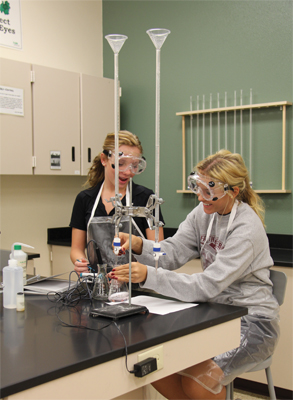
What do you want to get out of college?
At Faith Lutheran Middle School and High School, Las Vegas, Nevada, the counseling department meets with every freshman and their parent(s). Three years later we meet with every senior and their parent(s). While we have other contact with them during high school, we make it a priority to have at least two extensive meetings about their futures before they graduate. When I meet with them as freshmen, I tell them they have about 1,000 days to answer one very important question, “What do you want to get out of college?”
 The most common answer I get is “a degree.” If this were really the true answer, every student would go to their local community college and pay $250 a credit to get a degree. The average student (and parent) wants more than a degree. The second most common answer I get is “a career.” If this were really the true answer, students would go and get a job immediately out of high school to start their career or they would flock to technical schools. Again, the average person wants more. So it begs the question, “What is the right answer?”
The most common answer I get is “a degree.” If this were really the true answer, every student would go to their local community college and pay $250 a credit to get a degree. The average student (and parent) wants more than a degree. The second most common answer I get is “a career.” If this were really the true answer, students would go and get a job immediately out of high school to start their career or they would flock to technical schools. Again, the average person wants more. So it begs the question, “What is the right answer?”
 The answer will depend on the individual. In Nevada, many students want to go to college near the beaches of southern California. Some want a university like Oregon or Alabama so they can cheer on a really successful football team on Saturday afternoons. Some are sick of the desert so they want trees or a cooler climate. Some love mom and dad so much they want to stay close to home. Some love that relationship even more and they want to be as far away as possible! This is getting closer to answering the question correctly. If a student wants to be a doctor or a lawyer, this question is easy. The student wants to be prepared to get into a good medical school or a good law school.
The answer will depend on the individual. In Nevada, many students want to go to college near the beaches of southern California. Some want a university like Oregon or Alabama so they can cheer on a really successful football team on Saturday afternoons. Some are sick of the desert so they want trees or a cooler climate. Some love mom and dad so much they want to stay close to home. Some love that relationship even more and they want to be as far away as possible! This is getting closer to answering the question correctly. If a student wants to be a doctor or a lawyer, this question is easy. The student wants to be prepared to get into a good medical school or a good law school.
There are 4,599 accredited schools offering degrees in the United States. Almost 3,000 of them (2,870) are four-year institutions. While everyone has heard of Harvard, Stanford, and Yale, not everyone has heard of Harvey-Mudd. While the letters UCLA and USC may look good on a sweatshirt, it doesn’t mean it would be the “right fit” school for everyone. Students and parents should do their due diligence in looking for the school that is the right fit.
“College is simply the rest stop on the way to adulthood.”As parents and educators, we can assist in this process by helping students think about the question. We can also help them fight the term “perceived prestige.” Loren Pope, former editor of the New York Times, said it best. “Ranking colleges by their selectivity is like ranking hospitals based on the health of the patients it admits.” A wise parent once said to me, “College is simply the rest stop on the way to adulthood.” I like that quote. I also think it is very accurate. Most 18- to 22-year-olds are simply looking for a place to finish growing up. As their brains finish developing and as they work toward a degree and a career, let’s help students find the best environment in which to do so for them.
 As Christian parents and educators, we can engage our students in dialogue about the importance of a Christian education. There are plenty of Christians attending the University of Nevada just as there are non-Christians going to my alma mater, Concordia University-St. Paul. Having said that, it is important to think about the importance of being at a Christian college or university to the individual. When my own son was going through this process, he said one of the things he wanted out of college was to go to a Christian school. I asked him why, and his response was, “It’s just important to me at this stage in my life to have Christian instructors for the next four years.” While as a parent I was pleased with his answer, I also let him know that he was then eliminating a lot of schools because not all schools that claim to be Christian require their instructors to be professing Christians. His eventual choice, Concordia University Nebraska, fit his criteria. A friend of mine had a daughter who went to the University of Minnesota, and she made it a priority to get involved in the Lutheran church on campus. It would be incorrect to say she did not value her relationship with her Lord and Savior during her college years. Her actions exemplified her priorities.
As Christian parents and educators, we can engage our students in dialogue about the importance of a Christian education. There are plenty of Christians attending the University of Nevada just as there are non-Christians going to my alma mater, Concordia University-St. Paul. Having said that, it is important to think about the importance of being at a Christian college or university to the individual. When my own son was going through this process, he said one of the things he wanted out of college was to go to a Christian school. I asked him why, and his response was, “It’s just important to me at this stage in my life to have Christian instructors for the next four years.” While as a parent I was pleased with his answer, I also let him know that he was then eliminating a lot of schools because not all schools that claim to be Christian require their instructors to be professing Christians. His eventual choice, Concordia University Nebraska, fit his criteria. A friend of mine had a daughter who went to the University of Minnesota, and she made it a priority to get involved in the Lutheran church on campus. It would be incorrect to say she did not value her relationship with her Lord and Savior during her college years. Her actions exemplified her priorities.
Whether a student chooses to attend a public university or a private university, a Christian college or a community college, challenge them to continue their walk with God wherever they go.
John Chilman is college counselor at Faith Lutheran High School, Las Vegas, Nevada. John is past president of the Nevada School Counselor Association.
Photos courtesy Faith Lutheran High School, Las Vegas, Nevada.







